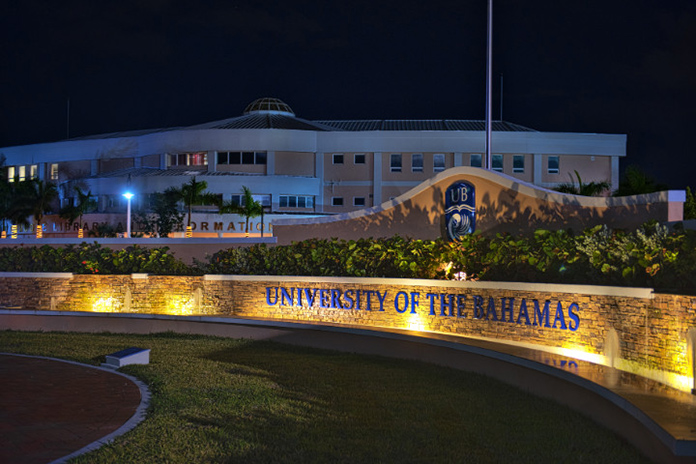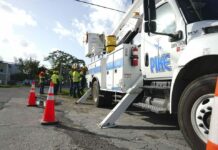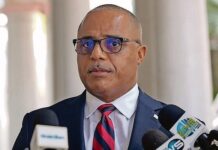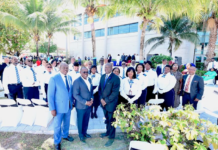
Nassau, THE BAHAMAS — With catastrophic natural events becoming more intense and deadly, The Bahamas aims to increase its capacity to comprehensively mitigate and manage these disasters by expanding expertise, as the memory of Hurricane Dorian remains poignant.
University of The Bahamas (UB) is collaborating with experts in the field to develop a series of internationally-recognized Disaster Risk Management (DRM) course offerings at the certification, bachelor’s and master’s degree levels, according to Provost and Vice President of Academic Affairs, Dr. Maria Oriakhi. The aim is to develop a resilient DRM workforce.
“In collaboration with the Inter-American Development Bank, our institution stands resolutely committed to the expansion of our course offerings in this pivotal domain, ensuring that the forthcoming generations of disaster risk managers are endowed with requisite acumen to safeguard our communities with the utmost efficiency,” she said.
Over the past few years, UB has been making steady progress in this area on several fronts. In the aftermath of Hurricane Dorian in 2019, UB established the Climate Change Adaptation and Resilience Research (CCARR) Centre to serve as a resource for small island developing states (SIDS) and coastal communities throughout the world to effectively address the human dimensions of climate change. Then, in 2022, UB executed a memorandum of understanding (MoU) with University of Hawaiʻi at Mānoa to formulate creative solutions to sea-level rise and island sustainability, disaster resilience, environmental sustainability, and other pertinent issues.
“By uniting disaster management practitioners, academic institutions, and international stakeholders, we harness the collective wisdom and resources requisite for the formulation of holistic solutions to our nation’s most exigent challenge,” said Dr. Oriakhi. “I harbor an unwavering conviction that through the symbiotic fusion of collaboration, innovation, and a new dedication to excellence, we’re poised to fashion a more resilient Bahamas, a bastion of strength and fortitude in the face of adversity.”
Dr. Oriakhi’s comments came just after UB and the Inter-American Development Bank’s (IDB) Preparedness, Recovery and Reconstruction Country Team (P2RCT) opened a joint Capacity Building Symposium on Tuesday, 30thApril. The focus of that dialogue, amongst other things, was to address DRM education and training needs.
Scores of educated and trained disaster risk managers, government representatives, and DRM scholars were engaged in crucial conversations to form a new vision for a national DRM education and training programme, and to establish a DRM Capacity Building Taskforce and action plan.
IDB Country Representative, Mrs. Daniela Carrera Marquis, said the IDB, a long-time partner and supporter of UB, stands ready and willing to assist in these and other efforts in the country.
“The comprehensive nature of The Bahamas’ disaster risk management programme underscores the need for a skilled workforce capable of addressing the intricate challenges of disasters,” said Ms. Marquis. “In light of this need, the IDB remains steadfast in its commitment to equipping The Bahamas and all of our member countries with the necessary capacity and capabilities to achieve their development goals.”
Dr. Marcellus Taylor, Permanent Secretary in the Ministry of Disaster Risk Management, said symposia like those are always timely and beneficial, because, as Hurricane Dorian showed The Bahamas and the world in 2019 that “disaster is always a day away”.
“While we have the time, we must prepare as a country, we must prepare as individual institutions, and we must prepare as individuals,” said Dr. Taylor. “So, I wish to encourage all of us, whenever there’s an opportunity to understand more about how we can reduce risk, that we take advantage of it. And some of the courses that the University and BTVI will put on, will be opportunities to do just that.”
Mr. Kevin Basden, Vice President of the Bahamas Technical & Vocational Institute (BTVI), underscored the institution’s full support.
“From BTVI’s perspective, we’re fully on board, we’re prepared to do as best we can training our workforce, but not just our workforce in terms of the community,” said Mr. Basden. “I think we need to get the information out there, the awareness out there. If there’s a need for persons to evacuate, how can we work together to evacuate? How can the agencies collaborate with one another as opposed to working in silos or duplicating (efforts)?
“And, one of the things we’ve learned over the years is, the better the coordination, the faster the recovery, and the better the work takes, and it’s more efficient.”







